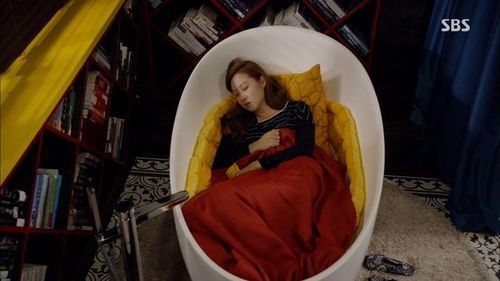This is a continuation of two earlier posts (Part 1 and Part 2) introducing the book of Job and a Korean Drama called It’s Okay, That’s Love (괜찮아, 사랑이야).

In an attempt to understand what Jae-yeol is going through, Hae-soo tries sleeping in the bathtub.
When it is clear to Jae-yeol’s friends that he is suffering from a mental illness, they get together to institute a plan of recovery for him. How different to Job’s friends, whose speeches are peppered with cutting remarks, with one even insinuating that Job’s children deserved to die because they had sinned against God.
Although the cause of Job’s sufferings was not mental illness, I do wonder if this would have made any difference, as his friends had a view that Job was the architect of his own misery, and they were not going to veer away from this position.
Well, Job wasn’t going to take this lying down, and continues to protest his innocence and makes further appeals to God. He also advises his friends to be a bit kinder:
‘I have heard many things like these; you are miserable comforters, all of you! Will your long-winded speeches never end? What ails you that you keep on arguing? I also could speak like you, if you were in my place; I could make fine speeches against you and shake my head at you. But my mouth would encourage you; comfort from my lips would bring you relief. (Job 16: 2-5)
So we have two contrasting situations: in the story of Job, the friends are unsupportive but Job is able to fight his own corner. In the story of Jae-yeol, his friends are very supportive but due to his mental condition, he is unable to help himself.
Most times it is impossible to pinpoint the reason behind our suffering. Job has an idea that God is behind it (although he does not know the reason why) but Jae-yeol has repressed his childhood memories sufficiently well enough to lead a relatively normal life (but not for long). However our own attitude – either towards God or in an illness, towards the right treatment – count for a lot in obtaining a right outcome.
But what if we have the right attitude but still find that the situation is too overwhelming for us to face alone? Job says of God:
He is not a mere mortal like me that I might answer him, that we might confront each other in court.’
He longs for this:
If only there were someone to mediate between us, someone to bring us together, someone to remove God’s rod from me, so that his terror would frighten me no more. Then I would speak up without fear of him, but as it now stands with me, I cannot. (Job 9:32-35)
Both Job and Jae-yeol need a mediator to help them restore their lives, as they are helpless to do this themselves. The Bible always points to Jesus as the ultimate redeemer in all situations. Sometimes, though, we do need to see this in a contemporary setting and I think this is where the genius of these dramas lie, in that it shows us in a very approachable emotional level what unconditional love looks like.
Jae-yeol with his friends
